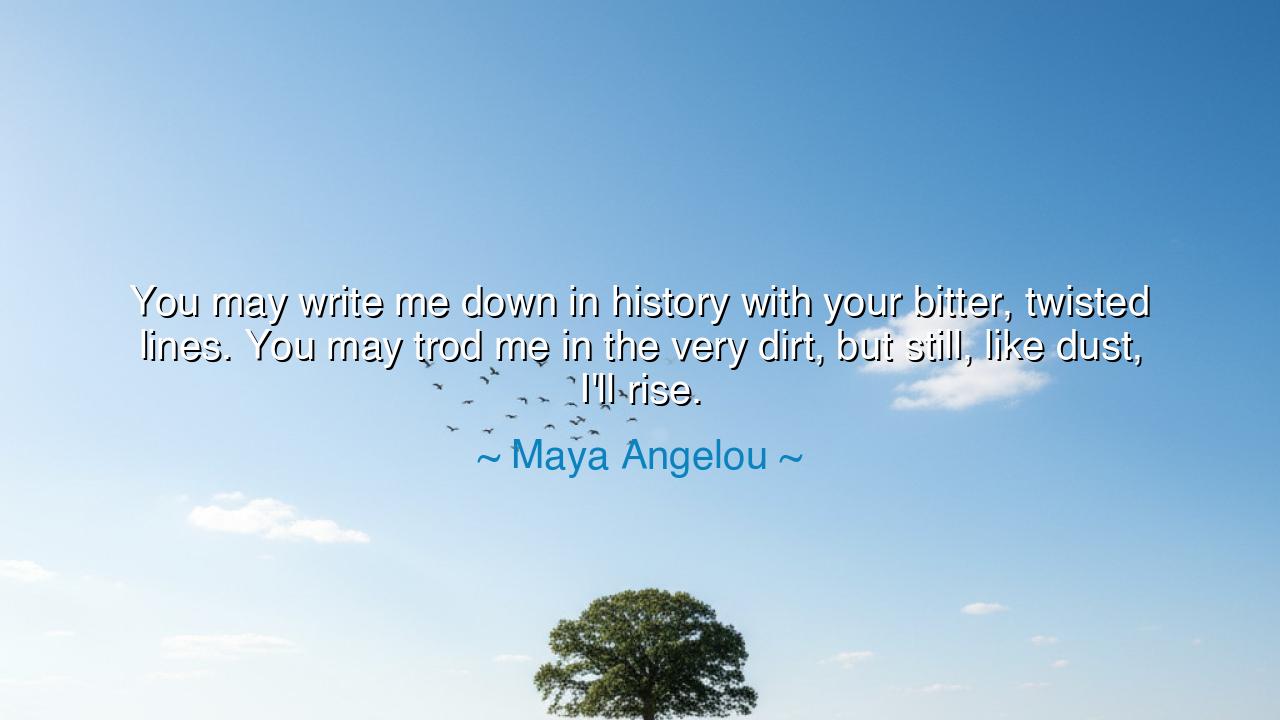
You may write me down in history with your bitter, twisted lines.
You may write me down in history with your bitter, twisted lines. You may trod me in the very dirt, but still, like dust, I'll rise.






When Maya Angelou declared, “You may write me down in history with your bitter, twisted lines. You may trod me in the very dirt, but still, like dust, I'll rise,” she spoke with the voice of a soul unbroken, a spirit that refuses to bow to oppression or cruelty. Her words echo like the call of a prophet across the centuries, reminding humanity that adversity is not the end of life, but the forge of resilience. No matter how history is written, no matter how cruel the treatment, the human spirit possesses an invincible capacity to rise, renewed and strengthened by the very forces that seek to crush it.
The origin of this quote lies in Angelou’s 1978 poem “Still I Rise,” a work born from a lifetime of personal and collective struggle. She had endured the trials of racism, sexism, and poverty in the United States, and yet she emerged not defeated, but empowered. Her lines are both a personal declaration and a universal truth: oppression may attempt to define or diminish, but the spirit that refuses to submit will transcend the weight of injustice. Through her words, Angelou transforms pain into power, sorrow into inspiration, and history into a canvas for defiance and hope.
Angelou’s message resonates with the wisdom of the ancients. The Stoics taught that suffering is not an impediment to greatness, but an opportunity for virtue; that adversity, when met with courage, shapes character. Likewise, Angelou’s assertion that she will rise “like dust” evokes the eternal cycle of nature, where even the smallest particles are resilient, returning to air, soil, and life. Her metaphor reminds us that human dignity is indestructible, capable of rising above cruelty and injustice, and that the soul’s ascent does not depend upon the judgment or condemnation of others.
Consider the story of Harriet Tubman, who, despite the chains of slavery and the constant threat of death, led countless enslaved men and women to freedom via the Underground Railroad. Tubman, trodden upon by systemic oppression, rose with unyielding courage and ingenuity. She embodies Angelou’s words: the dirt beneath her feet did not crush her spirit; it became the path to liberation for herself and others. Such examples illuminate the timeless truth that resilience is not born of ease, but of the refusal to be broken by injustice.
Angelou also speaks to the power of voice and narrative. “You may write me down in history with your bitter, twisted lines” acknowledges the ways in which oppressors attempt to define us, to rewrite the story for their own purposes. Yet her poem asserts that history cannot contain the fullness of a resilient life. Each act of oppression is met with self-definition, dignity, and resistance, ensuring that the true narrative — of survival, achievement, and grace — endures beyond the twisted lines of others.
The lesson extends beyond race and gender; it is a truth for all who face hardship. Life will inevitably bring trials, betrayal, or cruelty, and often those in power will attempt to diminish the worth of others. Angelou teaches that these assaults, while painful, are temporary, and they do not determine the final arc of our existence. By cultivating courage, faith, and perseverance, each individual can rise from hardship, stronger and more luminous, much like a phoenix emerging from ashes.
O listener, take this teaching to heart: do not allow the bitterness of others to define your being. Stand resilient against cruelty, injustice, and derision. Write your own history in deeds of courage, compassion, and integrity. Let every insult, every slight, every attempt to diminish you serve not as a wound, but as fuel for your ascent. In doing so, you honor the legacy of those who have risen before, and you prepare the way for those who will rise after.
In the end, Maya Angelou reminds us that resilience is both defiance and grace. To rise like dust is to assert that no force can erase the worth, dignity, or potential of the human spirit. Her words endure as a call to courage: even when trodden, even when maligned, the spirit rises — unstoppable, luminous, eternal — and in that rising, we find the power to transform the world and ourselves.






AAdministratorAdministrator
Welcome, honored guests. Please leave a comment, we will respond soon